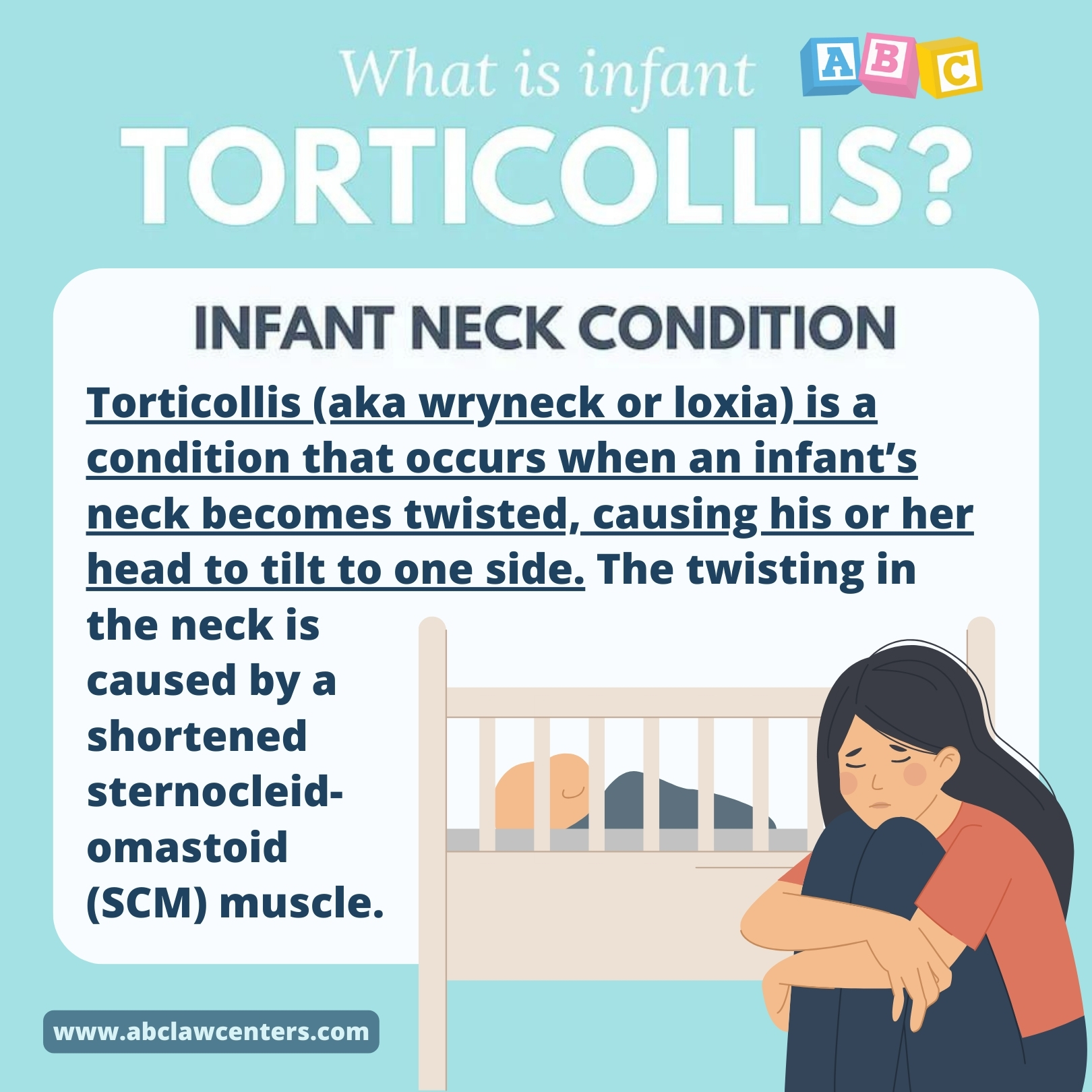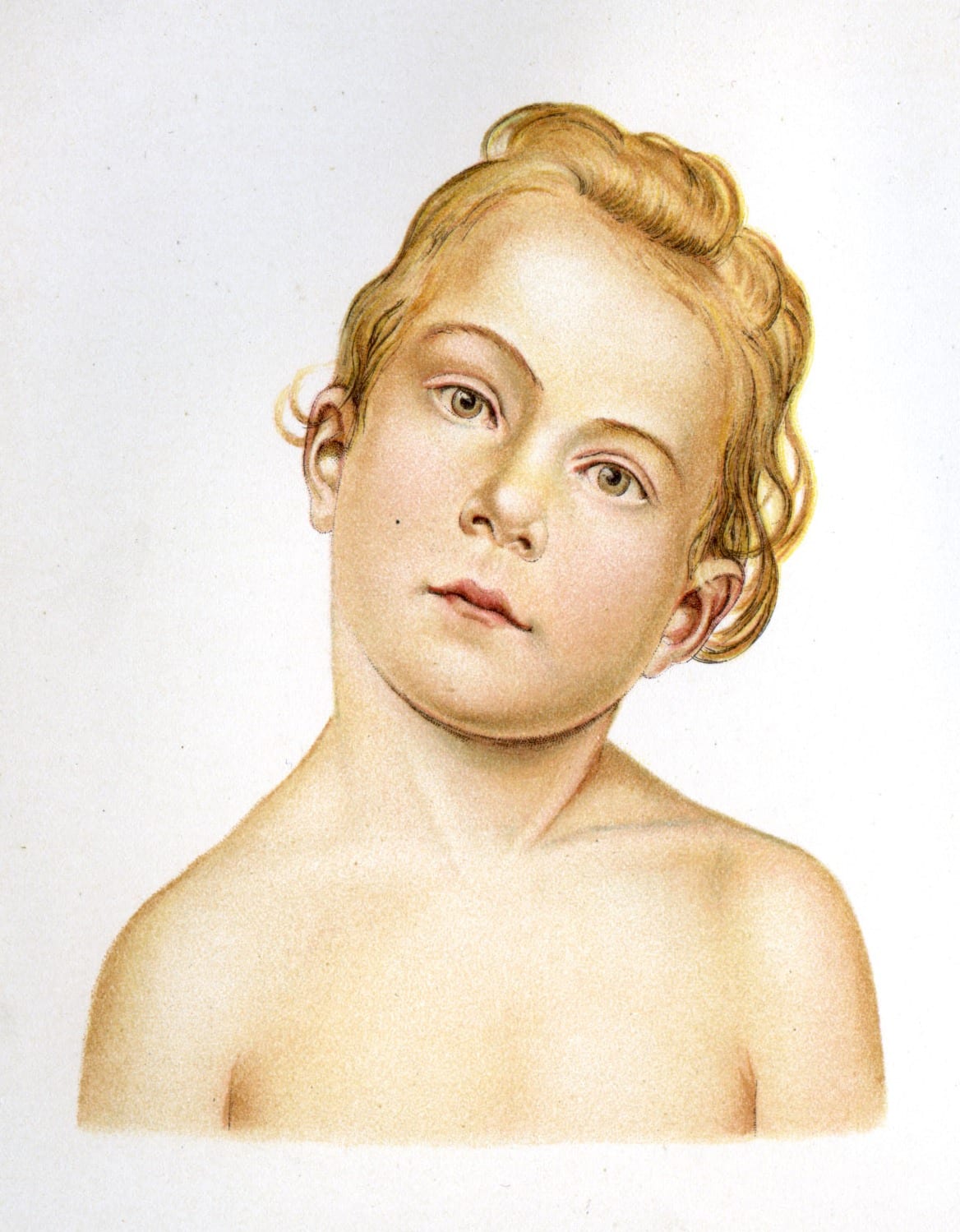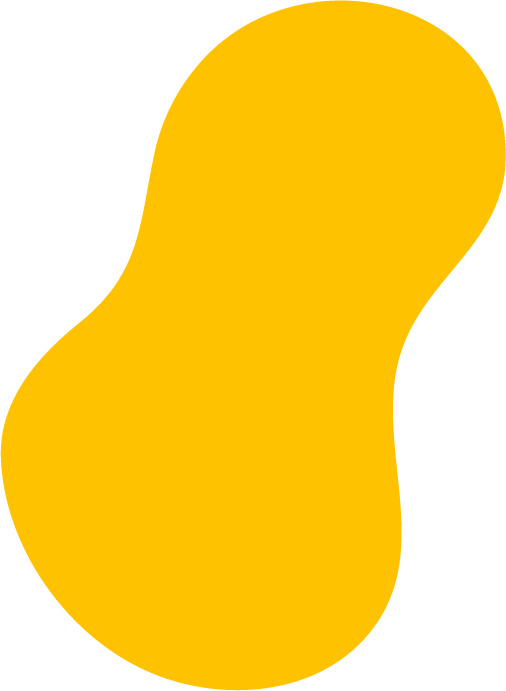Infant Torticollis
What is torticollis?
Torticollis is a condition that occurs when an infant’s neck becomes twisted, causing his or her head to tilt to one side. The twisting in the neck is caused by a shortened sternocleidomastoid (SCM) muscle. Other terms for torticollis include wry neck or loxia.

Types of Torticollis
Torticollis falls into two categories: congenital torticollis and acquired torticollis.
- Congenital torticollis is the most common type of torticollis. It occurs in less than 1-3.9% of infants. It usually occurs as a result of abnormal positioning in the womb or a difficult birth which stretched the SCM muscle, or the muscle that extends down the neck. Signs typically become evident within the first 8 weeks of life.
- Acquired torticollis has its onset in infancy or later childhood. It usually results from an injury or inflammation in the sternocleidomastoid or trapezius muscles. Because congenital torticollis is the most common form, it will be the focus of our practice area.

Signs and Symptoms of Torticollis
Infants with torticollis may have the following symptoms:
- A head which tilts to one side while the chin tilts to the other
- A flattened area or an asymmetrical shape (positional plagiocephaly) on one side of the head from always sleeping on that side. This condition could also be caused by crowding in the womb, however.
- A soft lump in the neck muscle (this occurs in the first few weeks)
- Pain or tenderness in the sternocleidomastoid or trapezius muscles
- Limited range of motion in the cervical spine
Causes of Torticollis
The most common cause of torticollis is muscle injury or inflammation from positioning in the womb or a difficult birth. However, there are other possible causes of torticollis that range from minor to severe. The following conditions can cause wryneck:
- Acute Infections
- Atlantoaxial Rotary Subluxation
- Spasmus Nutans
- Benign Paroxysmal Torticollis
- Sandifer Syndrome
- Dystonic Reaction
- Ocular Torticollis
- Various Rare Conditions
- Retropharyngeal Abscess
- Cervical Spine Injury
- Suppurative Jugular Thrombophlebitis
- Spinal Epidural Hematoma
- Central Nervous System Tumor
- Klippel-Feil Syndrome
Diagnosis of Torticollis
Because the causes of torticollis can be severe, it is imperative that signs and symptoms be reported to a medical professional. The doctor will conduct a physical examination, followed by x-rays, imaging tests, and ultrasound scans when necessary, in order to determine the cause of torticollis.
Treatment for Torticollis
Muscular torticollis is usually mild and will resolve after a few weeks with treatment of assigned exercises that can stretch the SCM muscle.
These exercises involve specific moves as the doctor instructs. They may include ways of encouraging the infant to turn his or her head to the side that or she doesn’t normally turn to. This may mean laying the infant down on the changing table or crib so that people approach on the side they don’t normally turn to. Parents may also be encouraged to feed the baby more often on the side they wouldn’t normally turn to. Finally, giving the infant the proper amount of tummy time will also help to solve their muscular torticollis.
If necessary, a doctor may refer a patient to an orthopaedic surgeon or physical therapist.
Long-Term Outcomes of Torticollis

The majority of cases of congenital muscular torticollis resolve within weeks with the performance of these exercises in accordance with medical advice. According to the American Academy of Orthopaedic Surgeons, approximately 10% of children with congenital muscular torticollis will require surgery to lengthen the short sternocleidomastoid muscle.
Should I get legal help?
Kids with torticollis and related birth injuries may require specialized medical resources and lifelong care. If your child was diagnosed with a birth injury and you suspect it is due to mismanaged torticollis, our experienced birth injury lawyers at ABC Law Centers: Birth Injury Lawyers can help. Our firm has focused exclusively on birth injury law for over 25 years, click here to begin your free case review.
Sources
- American Academy of Orthopaedic Surgeons
- Acquired Torticollis in Children
- Kids Health
- Tomczak, Kinga K, and N. Paul Rosman. “Torticollis.” Journal of Child Neurology, 2012, pp. 365–378.
- Baby Center


Legal Help for Torticollis and Birth Injuries
Children with injuries like torticollis often go on to require specialized medical and care resources. If you believe your loved one was permanently injured or disabled as the result of medical negligence, you may be entitled to compensation to help support your loved one’s needs.
ABC Law Centers: Birth Injury Lawyers is a United States law firm specifically handling pregnancy, labor and delivery, and newborn medical malpractice cases. To learn more about your potential case, you may contact our team for a free, confidential birth injury case review.
Featured Videos
Posterior Position
Hypoxic-Ischemic Encephalopathy (HIE)

Featured Testimonial
What Our
Clients Say…
After the traumatic birth of my son, I was left confused, afraid, and seeking answers. We needed someone we could trust and depend on. ABC Law Centers: Birth Injury Lawyers was just that.
- Michael


